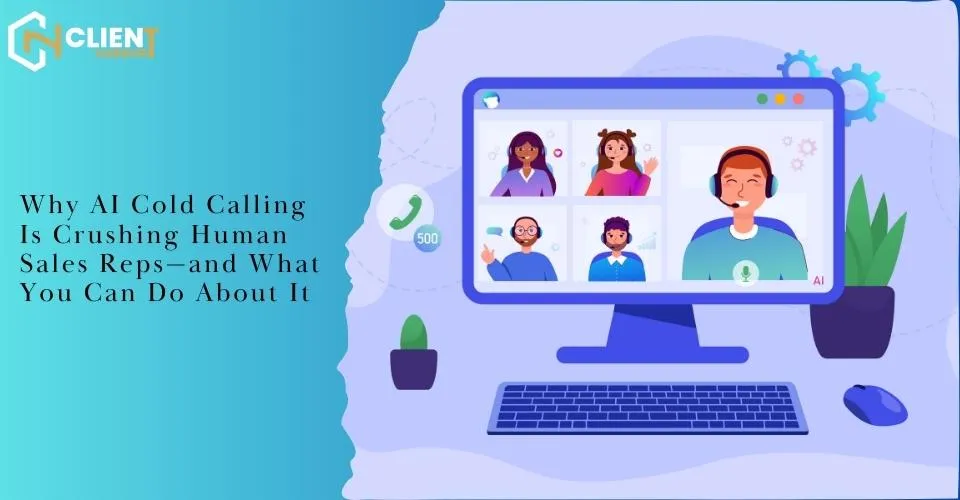
Why AI Cold Calling Is Crushing Human Sales Reps—and What You Can Do About It
Sales organizations have always relied on human agents to dial out, establish a rapport, and book meetings. Although this is an old, tested and proven formula, there are certain inherent constraints: inconsistent performance, high turnover, and the volume of calls needed to fill in the pipelines.
Over the last few years, an additional model has been introduced that uses the power of algorithms and real-time data analysis to make the initial outreach more accurate and cost-effective. This change is not only about substituting humans with the machines but a fundamental change in the way prospects are approached and developed.
Automation Evolution Process
The Evolution of Automation Automation has changed over the years as the following evolution diagram shows.
The primitive dialing systems could only automate numbers dialing, records and directing voicemails. Current platforms are thus much more advanced and operate on a level of natural language processing of responses, predictive analytics prioritizing leads in real-time, and machine learning ensuring that scripts are optimized.
Such developments have led to the development of AI cold calling services which have been able to alter pitch, tone and timing using dynamically variable pitch, tone and timing of a perspective, with respect to his/her profile and behavior signals. These systems become increasingly accurate and relevant since through successful interaction they just keep learning.
The Major Strengths of AI Promotions
Out of all the powerful advantages having an automated calling software has to offer, this has to be one of them: no new employee is required to scale it. The cluster with a single server is capable of making thousands of calls every hour at 24-hour operation without getting tired or forced to take a break.
And, lastly, these systems achieve 100 percent script fidelity, regulatory compliance, and brand message consistency. The sentiment analysis in real-time identifies points of interaction or pushback so the system can shift accordingly, and this is an easy task that human reps cannot perform without additional training and supervision.
Data-Driven Precision
At the heart of this transformation lies data. By ingesting CRM records, third-party firmographics, and historical engagement metrics, AI models score leads according to conversion likelihood. This scoring enables sales teams to focus human effort where it matters most—on conversations that require negotiation, empathy, and deep product knowledge. The ability to sift through vast datasets and surface high-value targets instantly has become a game-changer for companies looking to maximize return on marketing spend.
Challenges with Traditional Calling
Despite their empathy and creativity, human callers face scalability issues and variable performance. Even the most diligent rep can become fatigued after hundreds of dials, leading to declining energy and increased errors. Training new hires to achieve proficiency takes weeks, during which productivity remains low. Forgotten callbacks, delayed CRM entries, and inconsistent follow-up further erode momentum. In contrast, automated systems commit every detail to the database without omissions, ensuring a seamless multichannel cadence.
Integrating Human Expertise
Rather than viewing automation as a wholesale replacement, savvy organizations adopt a hybrid model. AI handles the high-volume, repetitive tasks—qualification questions, appointment scheduling, and preliminary objection handling—while human reps step in for complex discussions and relationship building. At Client Harbor we have guided numerous firms through this integration, helping them define clear handoff criteria and develop playbooks that leverage both machine efficiency and human insight for optimal results.
Upskilling Your Workforce
As automation takes over initial outreach, human teams must evolve. Training should shift from script memorization to consultative selling techniques, such as active listening, value-based positioning, and handling nuanced objections. By studying analytics provided by AI platforms—common pushback points, optimal call lengths, and successful closing patterns—reps can refine their approach. This data-driven coaching accelerates skill development and aligns rep behavior with proven best practices.
Operational Best Practices
Seamless collaboration between AI and humans requires robust data governance and clear process design. Clean, up-to-date contact lists feed more accurate models, while documented handoff workflows ensure that warm leads transition smoothly to human engagement. Weekly performance reviews incorporating AI-generated reports foster continuous improvement. By treating automation as a strategic teammate rather than a black box, sales leaders can harness its strengths while preserving the human touch where it truly counts—building trust and closing high-value deals.
A Comparative Overview
Aspect
AI Cold Calling Services
Human Sales Reps
Call Volume
Thousands/day, 24/7 operation
Hundreds/day, shift-limited
Lead Scoring
Real-time algorithmic prioritization
Manual list sorting, subjective
Script Consistency
Perfect fidelity, instant updates
Variable adherence
Adaptability
Real-time sentiment analysis
Relies on training, slower pivoting
Cost Structure
Subscription with predictable ROI
Salaries, benefits, variable output
Relationship Building
Personalized tokens, limited nuance
Deep rapport, emotional intelligence
Looking Ahead
The trajectory of conversational AI suggests continual improvement in natural dialogue and multi-channel orchestration. Voice agents are learning to handle more intricate queries, detect emotional cues, and maintain context over extended exchanges. Companies that adopt these advancements early will gain a significant edge in pipeline velocity and customer experience. At Client Harbor we anticipate the next frontier will involve AI-driven coaching assistants that provide real-time prompts to human reps during live calls, elevating performance and facilitating rapid skill transfer.
Conclusion
AI cold calling services have reshaped outbound strategies, delivering unparalleled efficiency and consistency. However, success lies in balancing automation with the irreplaceable strengths of human sellers—empathy, creativity, and complex problem-solving. By adopting a hybrid approach, upskilling teams, and maintaining rigorous data practices, organizations can achieve dramatic improvements in lead quality and conversion rates. As technology continues to evolve, those who blend machine precision with human ingenuity will redefine what’s possible in modern sales. Embrace this paradigm shift now to outpace competitors and build enduring customer relationships.
